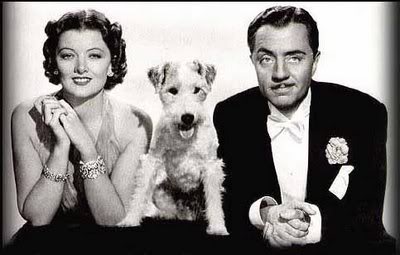 Speaking of deadlines, one that's coming up fast is the June 1 deadline for NaNoWriMo winners to get your free bound copy of a book from CreateSpace
Speaking of deadlines, one that's coming up fast is the June 1 deadline for NaNoWriMo winners to get your free bound copy of a book from CreateSpaceI mentioned before that I wasn't keen on the idea of self-publishing my NaNoWriMo novel, because I plan to submit it for traditional publishing. But, for any writer, there is probably always some art form that was done more for personal pleasure than for publication glory, and a print-on-demand press is the ideal platform for preserving that art for future generations. Even if you're not a NaNoWriMo winner, read on, for I have good news on that front!
In the interests of scrambling, I am compiling 20 years (golly, I'm old) of my poetry into a chapbook for the purpose. I'm laying it out in Microsoft Word, having my graphic design-adept husband craft a cover, and calling it a day.
Of course, first I had to dig out boxes from storage to find some older poems that weren't still (or ever) digitally entered on my computer. I chose a little over 130 poems to be in the book (why not go whole hog, when I'm not sure I'll do this again?), most of them recent, but a sampling from my teenage years. And then I had to figure out how to organize them all.
I threw out chronologically. Do I start with the early (read "bad") poems, so that's the first thing people see when they crack it open? Or do I go reverse chronologically and have the clunkiest poems be the last thing left in people's minds?
No, no, I needed some other arrangement. I considered grouping themes (school, parenting, nature, etc.), or structures (formal vs. informal, or even subdivided such as, sonnets together, sestinas here, etc.). But it seemed like it would be too repetitious for the reader.
 It finally came to me. A friend had recently crafted a beautiful self-published book of poetry and photography (see thumbnail to side). Because her photos are primarily macro nature shots, she wisely grouped her poems and pictures into a coherent seasonal progression.
It finally came to me. A friend had recently crafted a beautiful self-published book of poetry and photography (see thumbnail to side). Because her photos are primarily macro nature shots, she wisely grouped her poems and pictures into a coherent seasonal progression.I'm all about stealing what works, so I started making piles. Some poems were easy to sort: a poem with "July" in the title went in the summer stack, and a poem about the start of school went in autumn. Others were more metaphorical — poems of grief made it into winter, and hope for rebirth into spring. A few were more nebulous still. If the poem was mostly happy but not sentimental: That sounded summery to me. Did I sound pensive but not depressed? Fall, I think.
Eventually, I had four roughly equal stacks, and then it was time to make sure that the poems made a nice progression within each season, and leading from one season to the next. So, for instance, the autumn section would end with a poem suggesting colder days ahead. Again, some of this was bordering on esoteric, but it all seemed to work out.
For the week ahead, I'm editing and fine-tuning the layout. And then off my book goes to be printed! My very own proof copy of my very own poetry, on the page in black and white.
I chose to self-publish my poetry because I could submit it for publication, but I just don't want to. I write it because it begs to be written, not for a specific audience, and certainly not a commercial one. Unlike with my fiction! My novels also beg to be written, but I love having an audience in mind, and I don't at all mind revising my fiction to make it more sellable.
So, now for the good news — in perusing CreateSpace's site to determine the nitty-gritty of cost, shipping and handling, and royalty setups, I was pleasantly surprised that the prices for self-published black-and-white books are really astonishingly reasonable. And, they get you an ISBN and listed on Amazon.com
I had been intending just to take my proof copy and run, but it's sorely tempting (and, yes, cleary that was CreateSpace's clever intention!) to buy several copies of my cute little chapbook to hand out to family and friends this Christmas. (Nothing says "I love you" like a vanity press offering!)
I also realized I could offer my collected poetry for sale on my personal writing blog, in case other friends wanted to pony up the bucks necessary to purchase it. If they buy it through Amazon.com
So, even if you're not a NaNoWriMo winner, check out CreateSpace
So, think about the gems you have languishing in a drawer: a stack of short stories? A fabulous how-to on creating wool diaper covers? You can also self-publish (is that the right term here?) movies and music, so if you have a CD of children's lullabies you've been dying to have professionally produced to give to your kids as a Christmas present (been there, done that), that's also an option.
I'll try to write once I receive my proof copy with an update on quality, turnaround time, and final bill. Happy self-publishing!


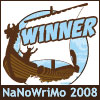
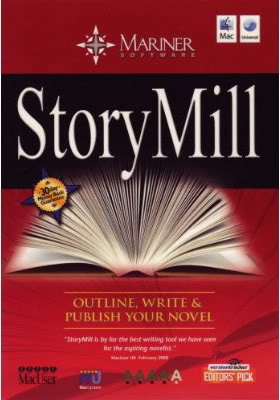


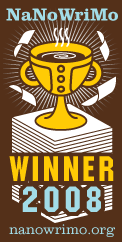

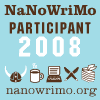
 Back during the first season of Survivor, there was an endurance test toward the end where the remaining contestants had to keep their hand on a pole. That was the only rule. One of the contestants, good old Rudy, absentmindedly removed his hand from the pole to scracth his nose or something, and then tried to play it off, but was deservedly disqualified.
Back during the first season of Survivor, there was an endurance test toward the end where the remaining contestants had to keep their hand on a pole. That was the only rule. One of the contestants, good old Rudy, absentmindedly removed his hand from the pole to scracth his nose or something, and then tried to play it off, but was deservedly disqualified.


